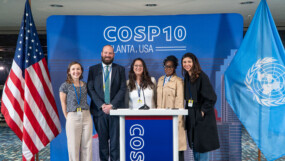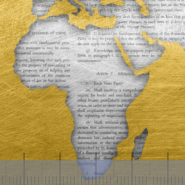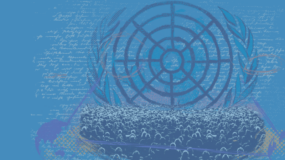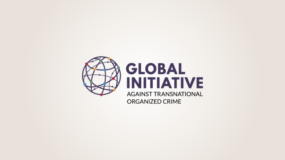Posted on 12 Jan 2024
UN anti-corruption conference in Atlanta maintains consensus despite politics, and makes limited progress in addressing links between organized crime and corruption.
The 10th Conference of States Parties (COSP) to the UN Convention against Corruption (UNCAC) took place in the US city of Atlanta from 11 to 15 December 2023. Delegates reached consensus on a wide range of resolutions after a gruelling schedule of negotiations in the preceding weeks and during the conference itself, drawn out by political wrangling aimed at frustrating the US as host country.
The issue of NGO participation threatened to overshadow the proceedings (as it did in Egypt two years ago), but following the precedent set by the 11th Conference of Parties (COP) to the UN Convention against Transnational Organized Crime (UNTOC) in 2022, the conference voted to grant observer status to the handful of NGOs objected to by Azerbaijan. The vote was passed overwhelmingly, with only Azerbaijan, Turkey and, unexpectedly, Ghana voting against the participation of the NGOs. Ghana later explained its position in its ministerial statement, saying that it objected to the process, not the NGOs in question. In anticipation of a vote, Turkey had dropped all objections to all the NGOs in the run-up to the opening of the session. The pre-session civil society forum, organized by the hosts and the UNCAC Coalition, provided much needed additional space for engagement, but the lack of civil society access to the COSP’s subsidiary bodies and the review mechanism remains a fundamental obstacle to open and effective engagement on the UNCAC.
The US, as the host country, faced its own challenges, with Iran, Russia and Venezuela leading efforts to block progress on US priorities. This resulted in the US’s flagship resolution being downgraded from an ‘Atlanta Declaration’ to a resolution titled ‘Atlanta 2023: promoting integrity, accountability and transparency in the fight against corruption’. The opening plenary session had already been interrupted by a statement from Iran (on behalf of Iran, Russia and Venezuela) outlining why they disagreed with the election of the COSP president (the US Department of State’s Coordinator on Global Anti-Corruption, Richard Nephew), citing their opposition to US sanctions policies. The group stopped short of calling for a vote (which they would have easily lost), but instead focused their efforts on ensuring that negotiations on all the resolutions tabled by the US and its Western allies were protracted and complicated.
The following topics were addressed in resolutions tabled by a diverse set of countries, negotiated and adopted by the COSP (the final texts are not yet available, but Transparency International has provided a summary review):
- Accountability (the Atlanta ‘Declaration’/Atlanta 2023), tabled by the US.
- Gender equality and corruption, tabled by Ghana. Iran succeeded in watering down references to gender so that the final text was simply titled ‘Addressing the societal impacts of corruption’.
- Follow-up to the Sharm el-Sheikh Declaration, tabled by Egypt.
- Protection of whistleblowers, two resolutions, later merged, tabled by Palestine and Serbia. Eventually co-sponsored by an eclectic mix of the EU, Norway, Russia, Saudi Arabia and Thailand.
- Measuring corruption, tabled by Saudi Arabia. Saudi Arabia is funding the UN Office on Drugs and Crime (UNODC) and the International Anti-Corruption Academy to develop new methods of measuring corruption, as a counterpoint to civil society-led indices, the results of which are not popular with countries that do badly in the rankings.
- Addressing the links between organized crime and corruption, tabled by Italy and Mexico.
- Mutual legal assistance in civil and administrative proceedings, tabled by Ecuador.
- Private sector corruption, tabled by Brazil.
- Beneficial ownership and asset recovery, tabled by Nigeria.
- Integrity in public procurement, tabled by France (analyzed by the Open Contracting Partnership).
- Follow-up to the Marrakesh Declaration, tabled by Morocco.
Adopted resolution on organized crime and corruption
The GI-TOC has long called for a more strategic and coordinated multilateral response to organized crime and corruption, and it is therefore the resolution tabled by Italy and Mexico that was of most interest to the organization. The final text, titled ‘Measures to address corruption involving organized criminal groups’, was co-sponsored by Australia, Brazil, Chile, the EU, Honduras, Japan, Morocco, Switzerland and the UK, and builds on previous resolutions of the UNCAC COSP and the UNTOC COP, which have recently begun to try to rebuild the link between the two conventions and their treaty bodies and processes.
The resolution notes the complementarities and links between the phenomena of organized crime and corruption, including how they are addressed through the implementation of the UNTOC and the UNCAC. The negotiations suffered setbacks and difficulties throughout, with Iran leading the opposition to strong references to the links between the two conventions. This is notable, as Iran is one of the few countries that has not yet become a party to the UNTOC. The resolution recognizes the role of civil society in preventing and countering corruption, and also takes note of the UNODC’s preparatory document for the COSP, which itself draws on input from both member states and civil society.
In its operative part, the resolution calls upon states to take a number of measures referred to in the UNCAC or in COSP resolutions to prevent and address corruption involving organized criminal groups, including measures to protect witnesses, whistleblowers and journalists, and more generally to support the role of civil society in facilitating effective responses. On cooperation, the resolution calls on states to make full use of the existing range of conventions, networks and other relevant mechanisms to enable effective and technical judicial cooperation and joint investigations. It also calls for the use of information on beneficial ownership, compliance with Article 61 of the convention on the exchange of information on emerging trends, and the facilitation of capacity building and technical assistance, in particular for developing countries.
Importantly, the resolution includes some follow-up measures for the COSP and thus for the multilateral system. Although earlier drafts included more ambitious and impactful ideas (such as joint or back-to-back meetings of the two processes), the adopted text outlines the below concrete follow-up actions:
- The UNCAC COSP working group on international cooperation is directed to discuss, at its next meeting, the ‘challenges concerning international cooperation in addressing corruption involving organized criminal groups, including the transnational nature of those crimes’, and to collect and analyze information on that topic, and develop a set of best practices and recommendations.
- The UNCAC COSP working group on prevention is instructed to hold a discussion on the prevention of ‘cooperation in addressing corruption involving organized criminal groups, including the transnational nature of those crimes’ and to submit suggestions to be integrated with the ideas of the working group on international cooperation (mentioned above).
Overall, the lengthy and fractious negotiations in the weeks leading up to and during the COSP took their toll on exhausted delegates at the end of a busy year, but the COSP maintained consensus on its outcomes, and some progress was made – including on the crime and corruption resolution. But consensus came at the cost of painful compromises – for the US hosts on their resolution, and watered-down language elsewhere, notably in the gender resolution tabled by Ghana. The maintained consensus and the limited progress made mask the fundamental challenges that remain in the implementation of the convention, in particular its lack of accessibility and transparency, and its lack of coordination with the UNTOC COP and the wider UN system.
Throughout the conference, the GI-TOC focused on the links between organized crime and corruption, and the necessity of civil society input for an effective response – in a breakout session in the pre-session civil society forum, in a side event on the Global Organized Crime Index and in our statement.



